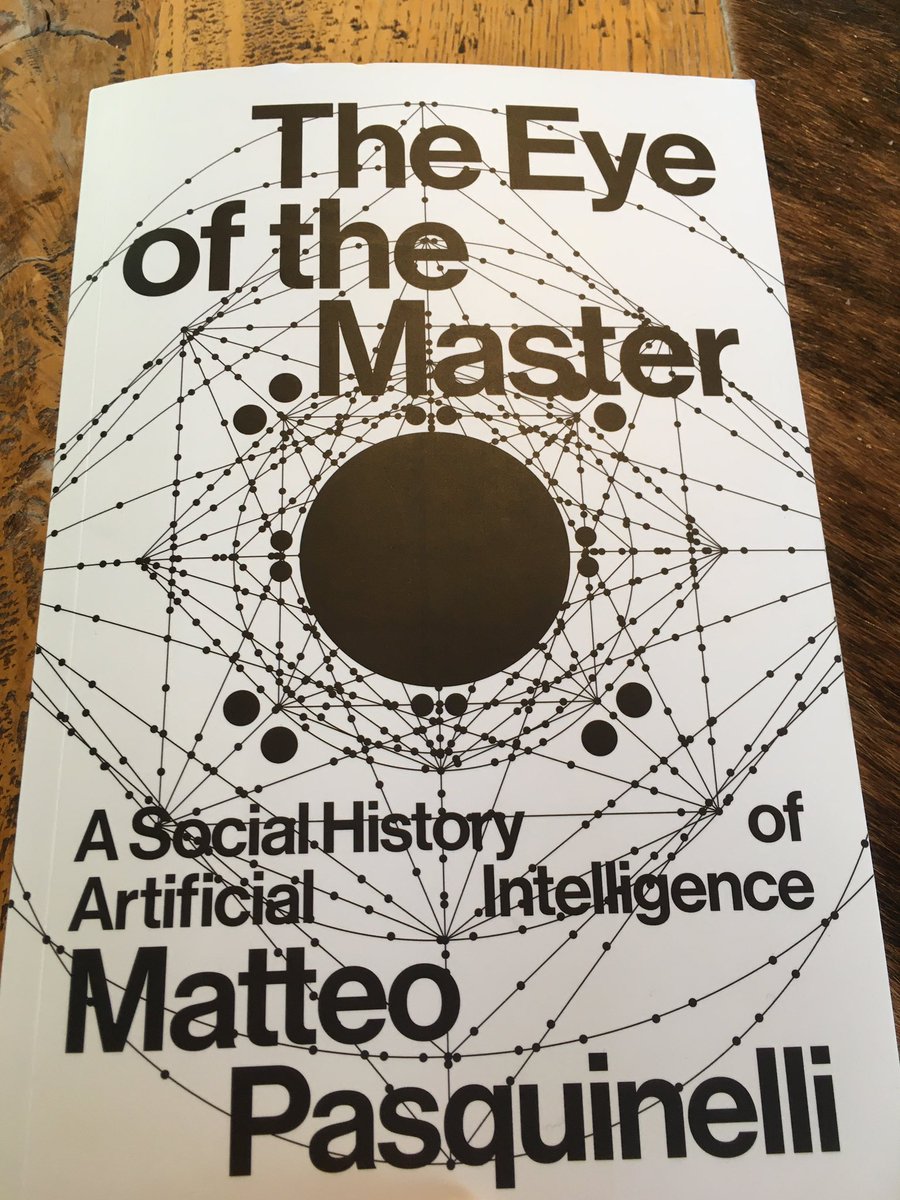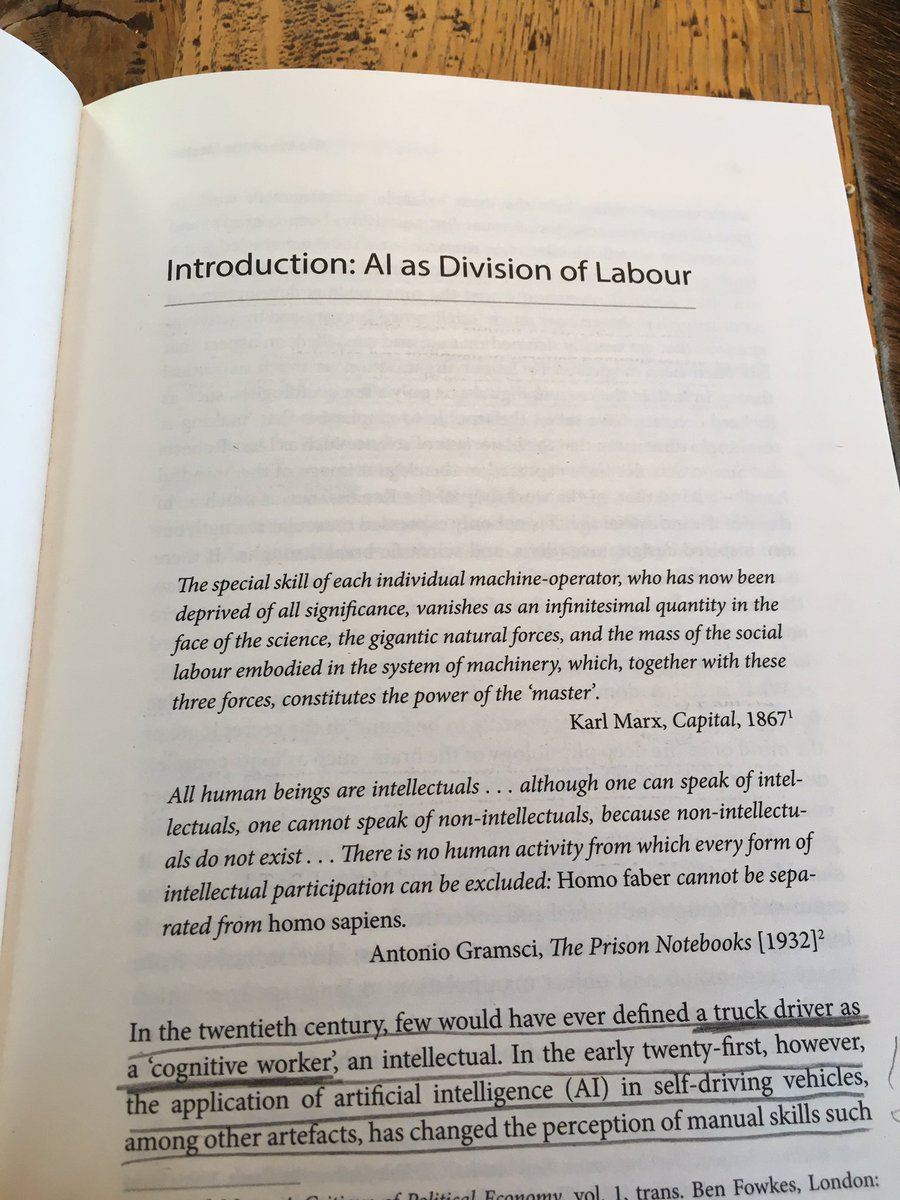
Political philosopher working on critical theory and economic thought. Assistant Professor at Tilburg University.
How to get URL link on X (Twitter) App



 Fraser starts from Marx, who defines capitalism as an economic system, or more exactly, a mode of production. Marx highlights sees 4 defining features, namely private ownership over the means of production, the commodification of human labor, capital as self-expanding value… 1/8
Fraser starts from Marx, who defines capitalism as an economic system, or more exactly, a mode of production. Marx highlights sees 4 defining features, namely private ownership over the means of production, the commodification of human labor, capital as self-expanding value… 1/8


 Rosenblatt had been trained in psychology with the upcoming techniques of psychometrics, meant to categorize personalities based on statistical multidimensional analysis. Psychometrics had been used to quantify human intelligence. 1/5
Rosenblatt had been trained in psychology with the upcoming techniques of psychometrics, meant to categorize personalities based on statistical multidimensional analysis. Psychometrics had been used to quantify human intelligence. 1/5


 Hayek reached worldwide acclaim with his intervention in the socialist calculation debate of the 1920s. Socialists believed calculative technology could be used to foster centralized planned economies, but Hayek pointed to the impossibility of centralizing dispersed knowledge.1/5
Hayek reached worldwide acclaim with his intervention in the socialist calculation debate of the 1920s. Socialists believed calculative technology could be used to foster centralized planned economies, but Hayek pointed to the impossibility of centralizing dispersed knowledge.1/5


 In the 1940s, cognitive theorists heavily debated the nature of perception and how to automate it. Gestalt psychology argued we immediately perceive full images that are more than the sum of their parts. AI must hence deduce information from these full images. 1/4
In the 1940s, cognitive theorists heavily debated the nature of perception and how to automate it. Gestalt psychology argued we immediately perceive full images that are more than the sum of their parts. AI must hence deduce information from these full images. 1/4


 In this chapter, Pasquinelli critiques the idea that AI deep learning neural networks imitate the brain’s structure. The historical epistemology is more complex because first cybernetics remodeled the brain into a self-organizing electrical circuit. 1/5
In this chapter, Pasquinelli critiques the idea that AI deep learning neural networks imitate the brain’s structure. The historical epistemology is more complex because first cybernetics remodeled the brain into a self-organizing electrical circuit. 1/5


 In conclusion, Pasquinelli asserts that industrialization was a movement toward abstraction on multiple fronts. Industrial machines uniquely separated their sources of energy from their sources of information. 1/5
In conclusion, Pasquinelli asserts that industrialization was a movement toward abstraction on multiple fronts. Industrial machines uniquely separated their sources of energy from their sources of information. 1/5


 Marx gets the term from Ricardian socialist William Thompson. He uses it only in the Fragment on Machines in the Grundrisse, but it became a major source of inspiration for workerist Marxism in Italy. 1/4
Marx gets the term from Ricardian socialist William Thompson. He uses it only in the Fragment on Machines in the Grundrisse, but it became a major source of inspiration for workerist Marxism in Italy. 1/4


 Babbage's famous invention of the Difference Machine was from the start imbricated in the history of industrial capitalism. The machine was supposed to perform calculations and logarithmic tables required for the management of colonial trade and large-scale industry. 1/6
Babbage's famous invention of the Difference Machine was from the start imbricated in the history of industrial capitalism. The machine was supposed to perform calculations and logarithmic tables required for the management of colonial trade and large-scale industry. 1/6


 While we often think of ‘algorithms’ as something recent linked to computer technology, Pasquinelli broadly defines them as rule-based problem-solving techniques to reveal a larger history of algorithmic thinking. 1/6
While we often think of ‘algorithms’ as something recent linked to computer technology, Pasquinelli broadly defines them as rule-based problem-solving techniques to reveal a larger history of algorithmic thinking. 1/6


 Pasquinelli starts from the observation that AI developments has inadvertently shown “low-skill” jobs like truck driving to hold a kernel of intelligence. Self-driving vehicles depend on AI learning how to mimic the intelligent decisions of drivers on the road. 1/5
Pasquinelli starts from the observation that AI developments has inadvertently shown “low-skill” jobs like truck driving to hold a kernel of intelligence. Self-driving vehicles depend on AI learning how to mimic the intelligent decisions of drivers on the road. 1/5

 Mau starts from the claim of value-form theory that Marx didn’t write his own economics but a *critique* of political economy. He was mainly criticizing others. While that may be true, it does not absolve Marx from the duty to develop his own ‘social ontology of capitalism’. 1/6
Mau starts from the claim of value-form theory that Marx didn’t write his own economics but a *critique* of political economy. He was mainly criticizing others. While that may be true, it does not absolve Marx from the duty to develop his own ‘social ontology of capitalism’. 1/6

 After decades of multiple economic crises, capitalism is as strong as ever. The question is what kind of power keeps capitalism in place despite all this instability and opposition. Marxists usually answer with a combination of violence and ideology. 1/6
After decades of multiple economic crises, capitalism is as strong as ever. The question is what kind of power keeps capitalism in place despite all this instability and opposition. Marxists usually answer with a combination of violence and ideology. 1/6

 Saito argues that Marx, over the course of the 1860s, abandoned the productivism and Eurocentrism of his earlier days. His studies of the ecological sciences and non-Western communities convinced him that capitalist industrialization as experienced in the Global North ... 1/6
Saito argues that Marx, over the course of the 1860s, abandoned the productivism and Eurocentrism of his earlier days. His studies of the ecological sciences and non-Western communities convinced him that capitalist industrialization as experienced in the Global North ... 1/6


 Some left-wing theorists double down on Marx' earlier optimism about technology and industrialization by claiming that full automation will make a post-capitalist future possible. Not only will automated technology increase productivity and thereby liberate more free time ... 1/7
Some left-wing theorists double down on Marx' earlier optimism about technology and industrialization by claiming that full automation will make a post-capitalist future possible. Not only will automated technology increase productivity and thereby liberate more free time ... 1/7

 In the previous chapters, Saito defended a theory of metabolism that combines ontological monism (ultimately everything is material) with methodological dualism (natural metabolic processes are to be studied as distinct from social metabolism). 1/9
In the previous chapters, Saito defended a theory of metabolism that combines ontological monism (ultimately everything is material) with methodological dualism (natural metabolic processes are to be studied as distinct from social metabolism). 1/9

 Most theories discussing the Anthropocene (Latour, Haraway, Moore, etc.) depart from ontological and methodological monism. The distinction between human society and non-human nature is unconvincing and critical theory should just treat all 'actants' alike. 1/
Most theories discussing the Anthropocene (Latour, Haraway, Moore, etc.) depart from ontological and methodological monism. The distinction between human society and non-human nature is unconvincing and critical theory should just treat all 'actants' alike. 1/

 Marx tends to be read as a Promethian productivist rather than an ecosocialist or degrowth communist. Saito hypothesizes that Engels has got something to do with that. He claimed that there was an intellectual division of labour with Marx focusing on social trends … 1/5
Marx tends to be read as a Promethian productivist rather than an ecosocialist or degrowth communist. Saito hypothesizes that Engels has got something to do with that. He claimed that there was an intellectual division of labour with Marx focusing on social trends … 1/5


 Saito starts with noting how Marx has historically been profiled as a pro-technology pro-growth productivist. We can thank Foster and Burkett for correcting this picture with their interpretation of Marx’ theory of metabolism. 1/8
Saito starts with noting how Marx has historically been profiled as a pro-technology pro-growth productivist. We can thank Foster and Burkett for correcting this picture with their interpretation of Marx’ theory of metabolism. 1/8

 The book starts from three things coming to an end today. (1) Fukuyama proclaimed a capitalist end of history and traditional Marxists view historical materialism as a progression toward the end of history, but the ecological crisis puts us for a potential end of *human* history.
The book starts from three things coming to an end today. (1) Fukuyama proclaimed a capitalist end of history and traditional Marxists view historical materialism as a progression toward the end of history, but the ecological crisis puts us for a potential end of *human* history.